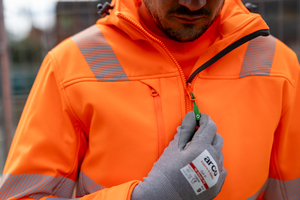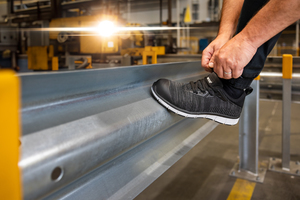
 |
Mark Sennett
Managing Editor |
 |
Kelly Rose
Editor |
Sustainable workwear
14 August 2024
Businesses expect suppliers to offer workwear that conforms to and supports their environmental agendas. Jim Harbidge looks at how responsible workwear is playing its part.

THE UK has set a legal target to achieve net zero by 2050. With this, some businesses have set more ambitious targets, aiming to achieve net zero sooner, meaning products and supply chains are being reassessed and are under greater scrutiny.
Workwear presents a challenge to the ESG targets of any company involved in the manufacture, procurement and usage of the clothing. An estimated 350,000 tones of used clothing goes to landfill in the UK every year, with a significant amount of this believed to be workwear1.
Businesses are now starting to expect suppliers to offer workwear that conforms to and supports their environmental agendas, which is where responsible workwear comes in.
Responsible workwear is clothing made from more environmentally conscious materials, such as organic cotton or recycled polyester, but also extends to clothing made with life-extending properties that reduce the amount of the product that is discarded.
Workwear is by nature hard to recycle as the design and manufacture of this type of clothing is often driven by cost. Because of its lower cost, polyester is the most used material when manufacturing this type of clothing. As a result, professional clothing, including workwear and uniforms, has become a growing focus for many businesses aiming to address sustainability shortfalls within their supply chains.
The materials used, supply chain routes and longevity of the product contribute to the overall environmental impact. Increased visibility of how a product is made and where the constituent materials are sourced from allow procurement teams to make responsible choices when it comes to sourcing the required items. Looking out for the marks of reporting frameworks, such as Better Cotton, Global Recycled Standard (GRS) and the Ethical Trading Initiative (ETI) on product information can inform buyers that the materials used are sourced responsibly. Equally, increasing the longevity of the product itself lowers the carbon footprint of the item's lifetime.
Supply chain
Complex and lengthy supply chains with connections across the globe are often necessary to fulfil demands, but these can increase the carbon footprint of a product because of extended raw material transport routes and processing in factories that do not have access to renewable energy.
Modern slavery can also exist in almost any stage of the supply chain, from harvesting or extracting raw materials to manufacturing and shipping. It is the responsibility of the buyer to ensure that products have come from a company that makes efforts to minimise the risk of modern slavery existing in supply chains. Membership to frameworks such as the Ethical Trading Initiative (ETI) and Sedex demonstrates a commitment to ethical supply chain practices.
Lower Carbon Materials
PPE and workwear that is designed with responsible materials is becoming more prevalent in the industry, with alternatives to traditional plastic components. Equally, the ability to recycle workwear and PPE is being demystified as companies invest in technologies and processes that can break down certain plastics to be reused for new garments.
Recently, development in materials and recycling processes means that PPE and workwear that would previously have ended up in landfill can now be broken down into constituent parts and reused for new garments.
Successfully recycling polyester and establishing an onshore UK supply chain will reduce the industry’s dependency on fossil fuels. It will also reduce pollution from the manufacturing process, as recycled polyester uses significantly less energy and resources compared with virgin polyester manufacture.
Longevity
The longevity of a piece of clothing is dependent on the duty of care that is taken to preserve it. Typical hi-vis workwear is guaranteed to last up to 25 washes when properly cared for, but newer workwear can be guaranteed to last even longer. Garments can also be tested to retain integrity, dimensional stability, UPF protection and colour fastness.
Some companies also offer the traceability of workwear throughout its life. To ensure garments retain properties and are only washed as many times as labelled, special laundromats can be used. Each step of the washing process is recorded for each item of clothing using an interwoven RFID chip that tracks the number of times the item has been washed. From this, water usage and carbon footprint can be calculated. This offers the companies full visibility over the whole process, minimising waste and maximising responsibility.
Once an item comes to the end of its life, the recovered components from the recycling process are valuable raw materials that can be transformed back into polyester yarn for garment production. This approach to re-creating raw materials helps to significantly decrease the environmental footprint of manufacturing, playing a pivotal role in the shift towards a circular economy.
Reporting Frameworks
There are a variety of organisations that exist to support companies that are making efforts towards sustainable solutions. When procuring products, purchasing teams should consider sourcing products from a company that is a member of one of these globally recognised reporting frameworks. Organisations such as the Global Recycled Standard (GRS), ETI, EcoVadis and Proposition 65 collaborate with manufacturers to report the extent to which their processes impact the world, transparently.
Conclusion
Net zero targets mean that businesses are reviewing all aspects of their operations to address any concerns and build for a more sustainable future. The increasing availability of responsibly sourced and recyclable materials presents an opportunity for companies to reduce their environmental impact and by prioritising durability and more responsible materials from responsible supply chains, businesses can align their workwear choices with their sustainability goals.
Last year, Arco launched its ‘Responsible Hi-Vis’ range, a line of hi-vis workwear made from certified recycled and responsibly sourced materials and developed with end-of-life in mind. The range earned Arco the Recycled Product of the Year award at the National Recycling Awards.
Find out how Arco enables customers to make more responsible choices here: www.arco.co.uk/about/a-responsible-choice.
Reference
1 https://www.bitc.org.uk/report/improving-the-sustainability-of-professional-clothing/
Jim Harbidge is head of sustainability at Arco. For more information, visit www.arco.co.uk
- Guide clears up first aid
- Arco unveils new state of the art centre
- Catalogue launch
- Outstanding contribution award
- Arco becomes Core Funder to National Emergencies Trust with £250,000 donation
- Arco to launch Big Book at Health & Safety '10 North
- Support for World Heart Day
- Support for deaf children
- Arco unveils new look big book
- Essentials range

























